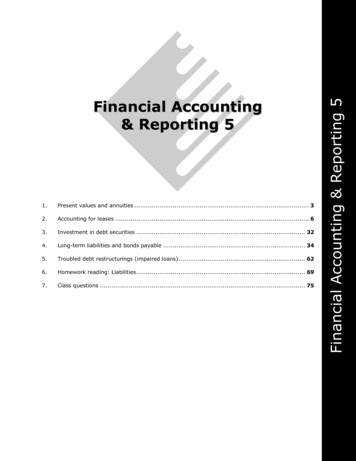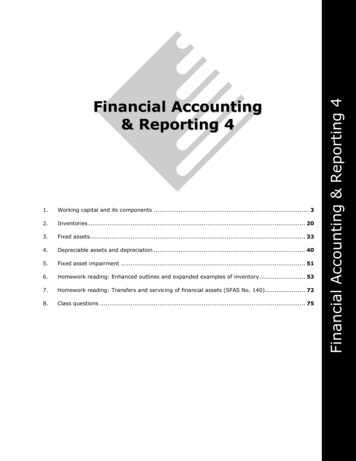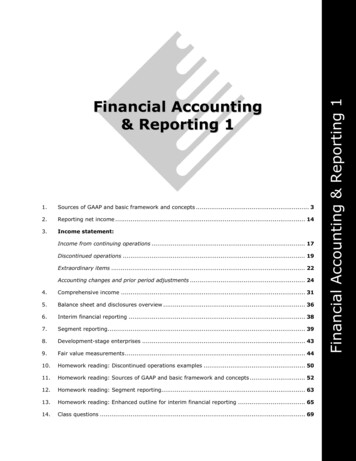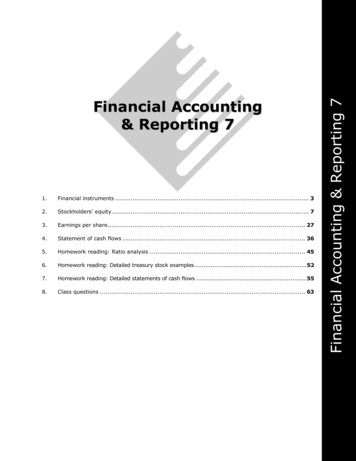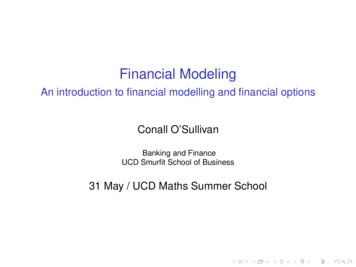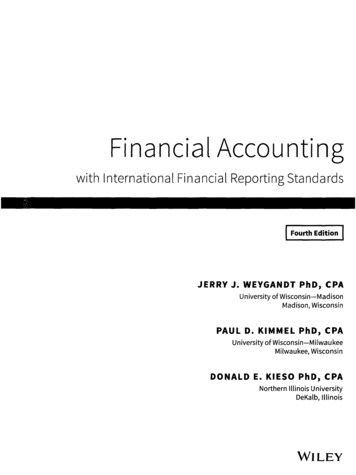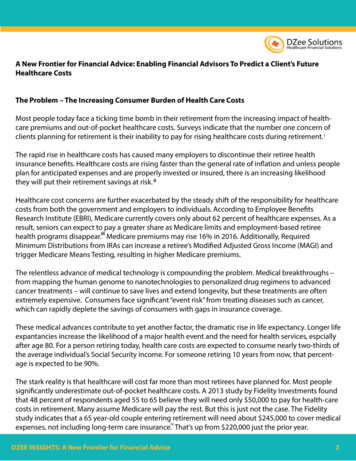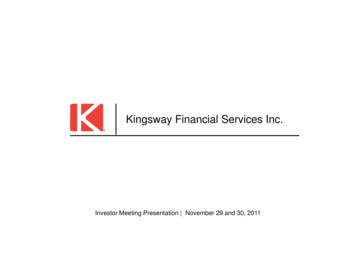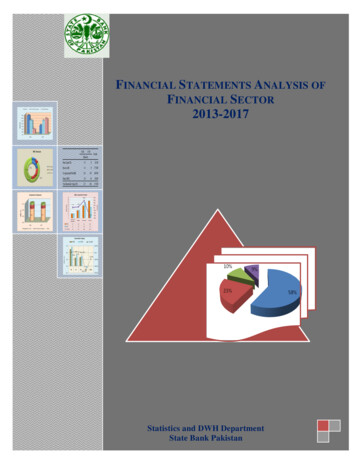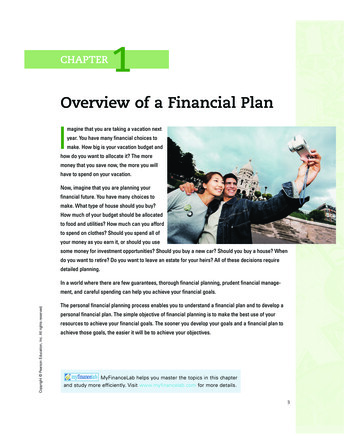
Transcription
MADURA 4e 0111/23/095:16 PMPage 3CHAPTER1Overview of a Financial PlanImagine that you are taking a vacation nextyear. You have many financial choices tomake. How big is your vacation budget andhow do you want to allocate it? The moremoney that you save now, the more you willhave to spend on your vacation.Now, imagine that you are planning yourfinancial future. You have many choices tomake. What type of house should you buy?How much of your budget should be allocatedto food and utilities? How much can you affordto spend on clothes? Should you spend all ofyour money as you earn it, or should you usesome money for investment opportunities? Should you buy a new car? Should you buy a house? Whendo you want to retire? Do you want to leave an estate for your heirs? All of these decisions requiredetailed planning.In a world where there are few guarantees, thorough financial planning, prudent financial manage-Copyright Pearson Education, Inc. All rights reserved.ment, and careful spending can help you achieve your financial goals.The personal financial planning process enables you to understand a financial plan and to develop apersonal financial plan. The simple objective of financial planning is to make the best use of yourresources to achieve your financial goals. The sooner you develop your goals and a financial plan toachieve those goals, the easier it will be to achieve your objectives.MyFinanceLab helps you master the topics in this chapterand study more efficiently. Visit www.myfinancelab.com for more details.3
MADURA 4e 01411/23/095:16 PMPage 4Chapter 1 Overview of a Financial PlanThe objectives of this chapter are to: Explain how you benefit from personal financial planning Identify the key components of a financial plan Outline the steps involved in developing your financial plan HOW YOU BENEFIT FROM ANUNDERSTANDING OF PERSONAL FINANCEpersonal financeThe process of planningyour spending, financing,and investing to optimizeyour financial situation.personal financial planA plan that specifies yourfinancial goals anddescribes the spending,financing, and investingplans that are intended toachieve those goals.Personal finance (also referred to as personal financial planning) is the process of planning your spending, financing, and investing to optimize your financial situation. Apersonal financial plan specifies your financial goals and describes the spending, financing, and investing plans that are intended to achieve those goals. Although the U.S. isone of the wealthiest countries, many Americans do not manage their financial situations well. Consequently, they tend to rely too much on credit and have excessive debt.Consider these statistics: More than 1.2 million people filed for personal bankruptcy in 2008.The level of savings in the U.S. is only about 1 percent of income earned. (Someinvestments, including retirement accounts, are not included as savings.)About half of all surveyed people in the U.S. who are working full-time state thatthey live from one paycheck to the next, without a plan for saving money.About 40 percent of people who work full time do not save for retirement. Thosewho do typically save a relatively small amount of money.opportunity costWhat you give up as aresult of a decision.An understanding of personal finance enables you to make informed decisions aboutyour financial situation. Each of your spending decisions has an opportunity cost, whichrepresents what you give up as a result of that decision. By spending money for a specific purpose, you forgo alternative ways that you could have spent the money and alsoforgo saving the money for a future purpose. For example, if your decision to use yourcell phone costs 100 per month, you have forgone the possibility of using that moneyto buy concert tickets or to save for a new car. Informed financial decisions increase theamount of money that you accumulate over time and give you more flexibility to purchase the products and services you want in the future.Judge the Advice of Financial AdvisersThe personal financial planning process will enable you to make informed decisionsabout your spending, saving, financing, and investing. Nevertheless, you may prefer toCopyright Pearson Education, Inc. All rights reserved.Make Your Own Financial DecisionsCopyright Pearson Education, Inc. All rights reserved.The lack of savings is especially problematic given the increasing cost of health careand other necessities. You will have numerous options regarding the choice of bankdeposits, credit cards, loans, insurance policies, investments, and retirement plans. Withan understanding of personal finance, you will be able to make decisions that canenhance your financial situation.How much do you know about personal finance? Various government agencies ofvarious countries have attempted to assess financial literacy in recent years. Surveys havedocumented that people tend to have very limited personal finance skills. In addition,surveys have found that many people who believe they have strong personal financeskills do not understand some basic personal finance concepts. Take the FinancialLiteracy Test, provided just before this chapter. Even if your knowledge of personalfinance is limited, you can substantially increase your knowledge and improve yourfinancial planning skills by reading this text. An understanding of personal finance isbeneficial to you in many ways, including the following:
MADURA 4e 0111/23/095:16 PMPage 5Components of a Financial Plan5rely on advice from various types of financial advisers. An understanding of personalfinance allows you to judge the guidance of financial advisers and to determine whethertheir advice is in your best interest (or in their best interest).EXAMPLEYou want to invest 10,000 of your savings. A financial adviser guarantees that yourinvestment will increase in value by 20 percent (or by 2,000) this year, but he willcharge you 4 percent of the investment ( 400) for his advice. If you have a backgroundin personal finance, you would know that no investment can be guaranteed to increasein value by 20 percent in one year. Therefore, you would realize that you should not trustthis financial adviser. You could either hire a more reputable financial adviser or reviewinvestment recommendations made by financial advisers on the Internet (often for free).Become a Financial AdviserAn understanding of personal finance may interest you in pursuing a career as a financial adviser. Financial advisers are in demand because many people lack an understanding of personal finance or are not interested in making their own financial decisions. Asingle course in personal finance is insufficient to start a career as a financial adviser, butit may interest you in taking additional courses to obtain the necessary qualifications. COMPONENTS OF A FINANCIAL PLANA complete financial plan contains your personal finance decisions related to six keycomponents:1.2.3.4.5.6.Budgeting and tax planningManaging your liquidityFinancing your large purchasesProtecting your assets and income (insurance)Investing your moneyPlanning your retirement and estateThese six components are very different; decisions concerning each are included inseparate plans that, taken together, form your overall financial plan. To begin yourintroduction to the financial planning process, let’s briefly explore each component.Copyright Pearson Education, Inc. All rights reserved.Copyright Pearson Education, Inc. All rights reserved.A Plan for Your Budgeting and Tax Planningbudget planning(budgeting)The process offorecasting futureexpenses and savings.assetsWhat you own.liabilitiesWhat you owe; your debt.net worthThe value of what youown minus the value ofwhat you owe.Budget planning (also referred to as budgeting) is the process of forecasting futureexpenses and savings. That is, it requires you to decide whether to spend or save money.If you receive 750 in income during one month, your amount saved is the amount ofmoney (say, 100) that you do not spend. The relationship between income received,spending, and saving is illustrated in Exhibit 1.1. Some individuals are “big spenders”:they focus their budget decisions on how to spend most or all of their income and therefore have little or no money left for saving. Others are “big savers”: they set a savingsgoal and consider spending their income received only after allocating a portion of ittoward saving. Budgeting can help you estimate how much of your income will berequired to cover monthly expenses so that you can set a goal for saving each month.The first step in budget planning is to evaluate your current financial position byassessing your income, your expenses, your assets (what you own), and your liabilities(debt, or what you owe). Your net worth is the value of what you own minus the valueof what you owe. You can measure your wealth by your net worth. As you save money,you increase your assets and therefore increase your net worth. Budget planning enablesyou to build your net worth by setting aside part of your income to either invest in additional assets or reduce your liabilities.
MADURA 4e 01611/23/095:16 PMPage 6Chapter 1 Overview of a Financial PlanExhibit 1.1How a Budget Plan Affects SavingsBIG SPENDERBIG erTaxesSpendingYour budget is influenced by your income, which in turn is influenced by your education and career decisions. Individuals who pursue higher levels of education tend to havesmaller budgets during the education years. After obtaining their degrees, however, theytypically are able to obtain jobs that pay higher salaries and therefore have larger budgets.A key part of budgeting is estimating the typical expenses that you will incur eachmonth. If you underestimate expenses, you will not achieve your savings goals.Achieving a higher level of future wealth requires you to sacrifice by keeping spendingat a lower level today.Many financial decisions are affected by tax laws, as some forms of income aretaxed at a higher rate than others. By understanding how your alternative financialchoices would be affected by taxes, you can make financial decisions that have the mostfavorable effect on your cash flows. Budgeting and tax planning are discussed in Part 1because they are the basis for decisions about all other parts of your financial plan.money managementDecisions regarding howmuch money to retain in aliquid form and how toallocate the funds amongshort-term investmentinstruments.credit managementDecisions regarding howmuch credit to obtain tosupport your spendingand which sources ofcredit to use.You should have a plan for how you will cover your daily purchases. Your expenses canrange from your morning cup of coffee to major car repairs. You need to have liquidity,or access to funds to cover any short-term cash needs. You can enhance your liquidityby utilizing money management and credit management.Money management involves decisions regarding how much money to retain in aliquid form and how to allocate the funds among short-term investments. If you do nothave access to money to cover your cash needs, you may have insufficient liquidity. Thatis, you have the assets to cover your expenses, but the money is not easily accessible.Finding an effective liquidity level involves deciding how to invest your money so thatyou can earn a return, but also have easy access to cash if needed. At times, you may beunable to avoid cash shortages because of unanticipated expenses.Credit management involves decisions about how much credit you need to supportyour spending and which sources of credit to use. Credit is commonly used to cover bothlarge and small expenses when you are short on cash, so it enhances your liquidity.Credit should be used only when necessary, however, as you will need to pay back borrowed funds with interest (and the interest expenses may be very high). The use ofmoney management and credit management to manage your liquidity is illustrated inExhibit 1.2.Copyright Pearson Education, Inc. All rights reserved.liquidityAccess to funds to coverany short-term cashdeficiencies.Copyright Pearson Education, Inc. All rights reserved.A Plan to Manage Your Liquidity
MADURA 4e 0111/23/095:16 PMPage 7Components of a Financial PlanExhibit 1.2Managing Your LiquidityMoneyManagementKeep some money availablein case it is neededAccess to moneyand/or creditEnsure access to creditin case it is neededCreditManagement7Cover expenses thatcannot be coveredby current incomeA Plan for Your FinancingLoans are typically needed to finance large expenditures, such as the payment of collegetuition or the purchase of a car or a home. The amount of financing needed is the difference between the amount of the purchase and the amount of money you have available, as illustrated in Exhibit 1.3. Managing loans includes determining how much youcan afford to borrow, deciding on the maturity (length of time) of the loan, and selecting a loan that charges a competitive interest rate.A Plan for Protecting Your Assets and Incomeinsurance planningDetermining the types andamount of insuranceneeded to protect yourassets.To protect your assets, you can conduct insurance planning, which determines the typesand amount of insurance that you need. In particular, automobile insurance and homeowner’s insurance protect your assets, while health insurance limits your potential medical expenses. Disability insurance and life insurance protect your income.A Plan for Your InvestingriskUncertainty surroundingthe potential return on aninvestment.Any funds that you have beyond what you need to maintain liquidity should be invested.Because these funds normally are not used to satisfy your liquidity needs, they can beinvested with the primary objective of earning a high return. Potential investmentsinclude stocks, bonds, mutual funds, and real estate. You must determine how much ofyour funds you wish to alloc
The personal financial planning process will enable you to make informed decisions about your spending, saving, financing, and investing. Nevertheless, you may prefer to personal finance The process of planning your spending, financing, and investing to optimize your financial situation. personal financial plan A plan that specifies your financial goals and describes the spending, financing .



